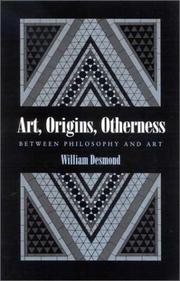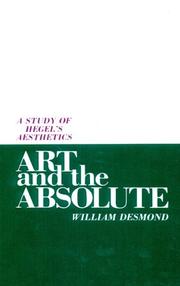| Listing 1 - 10 of 22 | << page >> |
Sort by
|
Book
ISBN: 0300037899 Year: 1987 Publisher: New Haven Yale University
Abstract | Keywords | Export | Availability | Bookmark
 Loading...
Loading...Choose an application
- Reference Manager
- EndNote
- RefWorks (Direct export to RefWorks)
Beginning --- Desire --- Dialectic --- Difference (Philosophy) --- Philosophy --- Mental philosophy --- Humanities --- Polarity --- Polarity (Philosophy) --- Appetency --- Longing --- Emotions --- Commencement --- Cosmology --- Creation --- Space and time --- Craving --- Yearning

ISBN: 0791486680 1417534192 9781417534197 079145746X 9780791457467 0791457451 9780791457450 9780791486689 Year: 2003 Publisher: Albany State University of New York Press
Abstract | Keywords | Export | Availability | Bookmark
 Loading...
Loading...Choose an application
- Reference Manager
- EndNote
- RefWorks (Direct export to RefWorks)
"This book deals diversely with the issues of art, origins, and otherness, both in themselves and in philosophical engagements with the works of Plato, Kant, Hegel, Schopenhauer, Nietzsche, and Heidegger. Addressing themes such as eros and mania, genius and the sublime, transcendence and the saving power of art, William Desmond tries to make sense of the paradox that too much has been asked of art that now almost nothing is asked of it. He argues that there is more to be said philosophically of art, and claims that art has the power to open up mindfulness beyond objectifying knowledge, as well as beyond thinking that claims to be entirely self-determining."--Jacket
Other (Philosophy) --- Art --- Aesthetics. --- Alterity (Philosophy) --- Otherness (Philosophy) --- Philosophy --- Beautiful, The --- Beauty --- Aesthetics --- Art and philosophy --- Esthetics --- Taste (Aesthetics) --- Criticism --- Literature --- Proportion --- Symmetry --- Philosophy. --- Analysis, interpretation, appreciation --- Psychology --- Radio broadcasting Aesthetics
Book
ISBN: 0813219612 9780813219615 9780813219608 0813219604 Year: 2012 Volume: v. 56 Publisher: Washington, D.C.
Abstract | Keywords | Export | Availability | Bookmark
 Loading...
Loading...Choose an application
- Reference Manager
- EndNote
- RefWorks (Direct export to RefWorks)
Philosophy, Modern. --- Metaphysics. --- Modern philosophy --- Philosophy --- God --- Ontology --- Philosophy of mind --- Academic collection
Book
ISBN: 0585087636 9780585087634 0791411036 0791411044 9780791411032 9780791411049 1438400942 9781438400945 Year: 1992 Publisher: Albany State University of New York Press
Abstract | Keywords | Export | Availability | Bookmark
 Loading...
Loading...Choose an application
- Reference Manager
- EndNote
- RefWorks (Direct export to RefWorks)
Hegel, Georg Wilhelm Friedrich, --- Hegel, Giorgio Guglielmo Frederico --- Hegel, Georg Wilhelm Friedrich --- Hegel, Georg Wilhelm Friedrich. --- History of philosophy --- Hegel, Georg W.F. --- Hēgeru, --- Hei-ko-erh, --- Gegelʹ, Georg, --- Hījil, --- Khegel, --- Hegel, G. W. F. --- Hegel, --- Hei Ge Er, --- Chenkel, --- Hīghil, --- הגל, --- הגל, גאורג וילהלם פרידריך, --- הגל, גיאורג וילהלם פרידריך, --- הגל, ג.ו.פ, --- היגל, גורג ווילהלם פרדריך, --- היגל, גיורג וילהלם פרידריך, --- 黑格尔, --- Hegel, Guillermo Federico, --- Hegel, Jorge Guillermo Federico, --- Heyel, Georg Wilhelm Friedrich, --- Higil, Gʼūrg Vīlhim Frīdrīsh, --- هگل, --- هگل، گئورگ ويلهم فريدريش,
Book
ISBN: 0585063354 9780585063355 1438400926 Year: 1986 Publisher: Albany State University of New York Press
Abstract | Keywords | Export | Availability | Bookmark
 Loading...
Loading...Choose an application
- Reference Manager
- EndNote
- RefWorks (Direct export to RefWorks)
Aesthetics, Modern --- Art --- Philosophy & Religion --- Philosophy --- Modern aesthetics --- Art, Occidental --- Art, Visual --- Art, Western (Western countries) --- Arts, Fine --- Arts, Visual --- Fine arts --- Iconography --- Occidental art --- Visual arts --- Western art (Western countries) --- Arts --- Aesthetics --- History --- Hegel, Georg Wilhelm Friedrich, --- Hegel, Giorgio Guglielmo Frederico --- Hegel, Georg Wilhelm Friedrich --- Contributions in aesthetics. --- Art, Primitive --- Hēgeru, --- Hei-ko-erh, --- Gegelʹ, Georg, --- Hījil, --- Khegel, --- Hegel, G. W. F. --- Hegel, --- Hei Ge Er, --- Chenkel, --- Hīghil, --- הגל, --- הגל, גאורג וילהלם פרידריך, --- הגל, גיאורג וילהלם פרידריך, --- הגל, ג.ו.פ, --- היגל, גורג ווילהלם פרדריך, --- היגל, גיורג וילהלם פרידריך, --- 黑格尔, --- Hegel, Guillermo Federico, --- Hegel, Jorge Guillermo Federico, --- Heyel, Georg Wilhelm Friedrich, --- Higil, Gʼūrg Vīlhim Frīdrīsh, --- هگل, --- هگل، گئورگ ويلهم فريدريش,
Book
ISBN: 9780231178761 9780231543002 023154300X 023117876X Year: 2016 Publisher: New York, NY : Columbia University Press,
Abstract | Keywords | Export | Availability | Bookmark
 Loading...
Loading...Choose an application
- Reference Manager
- EndNote
- RefWorks (Direct export to RefWorks)
William Desmond sees religion, art, philosophy, and politics as essential and distinctive modes of human practice, manifestations of an intimate universality that illuminates individual and social being. They are also surprisingly permeable phenomena, and by observing their relations, Desmond captures notes of a clandestine conversation that transforms ontology.

ISBN: 0887061516 Year: 1986 Publisher: New York State University
Abstract | Keywords | Export | Availability | Bookmark
 Loading...
Loading...Choose an application
- Reference Manager
- EndNote
- RefWorks (Direct export to RefWorks)
Aesthetics, Modern --- Art --- Philosophy --- History
Book
ISBN: 9781532617102 9781498241540 1498241549 1532617100 Publisher: Wipf and Stock Publishers.
Abstract | Keywords | Export | Availability | Bookmark
 Loading...
Loading...Choose an application
- Reference Manager
- EndNote
- RefWorks (Direct export to RefWorks)
This book gathers a set of reflections on the gift of beauty and the passion of being. There is something surprising about beauty that we receive and that moves the passion of being in us. The book takes issue with an ambiguous attitude to beauty among some who proclaim their advanced aesthetic authenticity. Beauty seems bland and lacks the more visceral thrill of the ugly, indeed the excremental. We crave what disrupts and provokes us, not what gives delight or even consoles. By contrast, attention is given to how beauty arouses enigmatic joy in us, and we enjoy an elemental rapport with it as other. Surprised by beauty, our breath is taken away, but we are more truly there with the beautiful when we are taken outside of ourselves. We are first receivers of the gift of surprise and only then perceivers and conceivers. My attention to the passion of being stresses a patience, a receptivity to what is other. What happens is not first our construction. There is something given, something awakening, something delighting, something energizing, something of invitation to transcendence. The theme is amplified in diverse reflections: on life and its transient beauty; on soul music and its relation to self; on the shine on things given in creation; on beauty and Schopenhauer's dark origin; on creativity and the dynamis in Paul Weiss's creative ventures; on redemption in Romanticism in the thought of Stanley Cavell; on theater as a between or metaxu; on redeeming laughter and its connection with the passion of being.
Aesthetics --- Art --- Philosophy and religion --- Transcendence (Philosophy) --- Metaphysics --- Emotions --- Religious aspects --- Philosophy --- Cavell, Stanley, --- Schopenhauer, Arthur, --- Weiss, Paul, --- Aesthetics. --- Philosophy and religion. --- Metaphysics. --- Emotions. --- Religious aspects. --- Philosophy.
Book
ISBN: 1317492854 1317492862 1315711745 128294729X 9786612947292 1844654087 9781844654086 1844651282 9781844651283 9781317492863 9781317492856 9781315711744 9781282947290 6612947292 9781844651290 1844651290 9780520258358 0520258355 9780520258617 0520258614 Year: 2008 Publisher: Stocksfield [England] Acumen
Abstract | Keywords | Export | Availability | Bookmark
 Loading...
Loading...Choose an application
- Reference Manager
- EndNote
- RefWorks (Direct export to RefWorks)
Once regarded as a minor Socratic school, Cynicism is now admired as one of the more creative and influential philosophical movements in antiquity. First arising in the city-states of late classical Greece, Cynicism thrived through the Hellenistic and Roman periods, until the triumph of Christianity and the end of pagan antiquity. In every age down to the present, its ideals of radical simplicity and freedom have alternately inspired and disturbed onlookers. This book presents the first general survey of Cynicism in antiquity for over fifty years. Drawing on a wealth of new research, William Desmond offers a comprehensive study of the most important ancient Cynics and their ideas, examining their rejection of various traditional customs and the rebellious life-style for which they were notorious. Desmond considers both the fragmentary ancient evidence on the Cynics and the historical interpretations that have shaped Cynic philosophy over later centuries. The central chapters locate major Cynic themes; its critique of convention, praise of natural simplicity, advocacy of self-sufficiency, defiance of Fortune, and celebration of freedom; within the rich matrix of ideas debated by the ancient schools and shows that far from being pessimistic or nihilistic, as modern uses of the term; suggest, the ancient Cynics were astonishingly optimistic regarding human nature. Cynics offers a fascinating introduction to some of the most colourful personalities of antiquity and a school of thought which continues to generate much philosophical interest today.
Book
ISBN: 9780823291885 Year: 2022 Publisher: New York, NY
Abstract | Keywords | Export | Availability | Bookmark
 Loading...
Loading...Choose an application
- Reference Manager
- EndNote
- RefWorks (Direct export to RefWorks)
| Listing 1 - 10 of 22 | << page >> |
Sort by
|

 Search
Search Feedback
Feedback About UniCat
About UniCat  Help
Help News
News